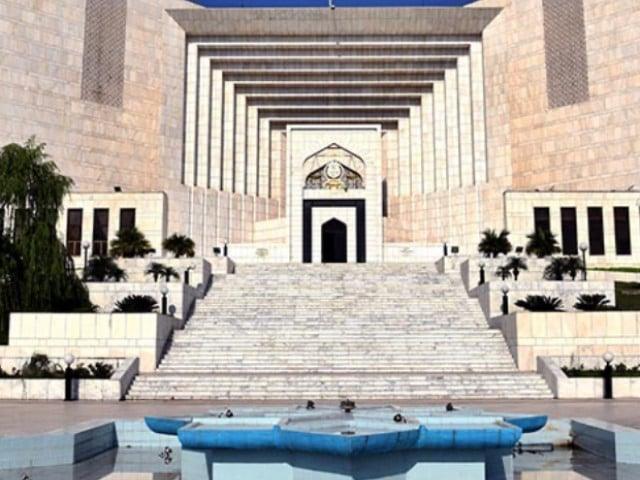ISLAMABAD:
The Supreme Court has declared that the Election Commission of Pakistan (ECP) failed in its constitutional duty to implement the will of the people and behaved in a manner not in consonance with its constitutional duty.
“It is unfortunate that despite the clear pronouncements of this court, the ECP is conducting itself in a manner that is not in consonance with its constitutional duty.
“Quite, [its conduct] aligns with the notion that they have the constitutional power to ignore other constitutional institutions and the basic right to vote,” said an additional six-page note written by Justice Ayesha Malik in the MNA Adil Bazai case.
Justice Ayesha was part of a three-member bench headed by Justice Syed Mansoor Ali Shah and comprising Justice Aqeel Ahmed Abbasi that on December 12 unanimously set aside the ECP’s decision to disqualify Bazai on account of his alleged defection in under Article 63A of the Constitution.
The judge, whose opinion was supported by two other members of the court, reminded the ECP that elections are the lifeline of democracy and that the ECP is the guarantor of electoral integrity.
“The independence of the PCE, therefore, is fundamental to the electoral process without which the very basis of democracy is undermined.
“This court has also recognized and declared that the ECP must not be subordinated to political influences, nor political engineering, but remain an impartial custodian of democracy, since any inclination of the ECP in favor of the government would compromise the legitimacy of the political system .
“At the center of protecting electoral integrity is the right to vote and the exercise of this right by the people. The supremacy of the vote underscores the idea that power and legitimacy in a democratic system derive their consent from the governed, which is why an “An independent constitutional body is needed to ensure that the will of the people through election is realized.”
He said the facts of the present case compelled the court to reiterate once again that the constitutional duty of the ECP cannot be considered as a general constitutional power vis-à-vis other constitutional provisions and institutions.
“The ECP is, as constitutionally mandated, an independent body, whose duty is to conduct free and fair elections and ensure that those elected by the people remain in government.
“The independence of the ECP is the fundamental safeguard in a democratic system that maintains the integrity of elections and ensures that the will of the people is translated into their consent to be governed by elected representatives.”
He said that this independence gives legitimacy to the government because it is based on the election of the people. “This is what builds public trust, protects the rule of law and protects people from political manipulation.”
“The Constitution expressly establishes that the authority of the government rests solely on the will of the people. This will is manifested through the exercise by the people of their right to vote and participate in the electoral and political process.
“Elections are the primary way that registered voters choose representatives who will govern on their behalf and exercise the powers of government. This is a fundamental right guaranteed by the Constitution,” he added.
In the main verdict written by Justice Syed Mansoor Ali Shah and supported by the other two members, the SC noted that the ECP’s findings on the authenticity and validity of the consent affidavit dated February 16, 2024 were contrary to weight of the recorded material. and legally unsustainable.
The PML-N claimed that Bazai, an independent candidate who won the election from Quetta’s NA-262 constituency, had initially filed an affidavit to join the party.
However, he later “switched allegiance”, according to the PML-N, and became part of the Sunni Ittehad Council (SIC), a party comprising independent candidates backed by the PTI.
Bazai had claimed that the affidavit regarding his joining the PML-N was false. However, the ECP removed him on November 21 in view of the Electoral Act, 2017.
The SC said that since Bazai was not found to be a member of the PML-N Parliamentary Party, the statements made by the PML-N chief regarding the appellant’s defection from that party, and the confirmation of the same by the ECP through the impugned orders, were without jurisdiction.
“Consequently, these appeals are allowed. The impugned orders issued by the Commission are annulled and the statements of the PML-N party chief to the effect that the appellant had deserted the said political party are not confirmed.
“Consequently, the appellant’s membership in the National Assembly from seat NA-262 is restored as an independent member, not as a member of the PML-N parliamentary party.”
However, the court clarified that this court’s determination of the authenticity and validity of the affidavit of consent dated February 16 was subject to the final determination of a civil court.
“Given the seriousness of the appellant’s allegations regarding the fabrication and use of a false affidavit of consent against Shehbaz Sharif, the then president of the PML-N and now prime minister of Pakistan, we hope that the civil court, where the sub judice civil suit, and the Magistrate, before whom the criminal complaint is pending decision, will decide on the same as soon as possible,” he said.




